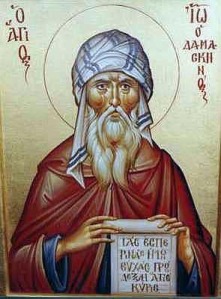 Behold the Virgin, the daughter of Adam and Mother of God; through Adam she gives her body to the earth, her soul to her Son above in the heavenly courts.
Behold the Virgin, the daughter of Adam and Mother of God; through Adam she gives her body to the earth, her soul to her Son above in the heavenly courts.
Let the holy city be sanctified, and rejoice in eternal praise. Let angels precede the divine tabernacle on its passage, and prepare the tomb.
Let the radiance of the spirit adorn it. Let sweet ointment be made ready and poured over the pure and undefiled body. Let a clear stream of grace flow from grace in its source.
Let the earth be sanctified by contact with that body. Let the air rejoice at the Assumption. Let gentle breezes waft grace. Let all nature keep the feast of the Mother of God’s Assumption.
[…] Let us draw round that most sacred bed and sing the sweet words, “Hail, full of grace, the Lord is with thee.
“Hail, predestined Mother of God. Hail, thou chosen one in the design of God from all eternity, most sacred hope of earth, resting-place of divine fire, holiest delight of the Spirit, fountain of living water, paradise of the tree of life, divine vine-branch, bringing forth soul-sustaining nectar and ambrosia.
“Full river of spiritual graces, fertile land of the divine pastures, rose of purity, with the sweet fragrance of grace, lily of the royal robe, pure Mother of the Lamb of God who takes away the sins of the world, token of our redemption, handmaid and Mother, surpassing angelic powers.”
Come, let us stand round that pure tomb and draw grace to our hearts. Let us raise the ever-virginal body with spiritual arms, and go with her into the grave to die with her.
Let us renounce our passions, and live with her in purity, listening to the divine canticles of angels in the heavenly courts.
Let us go in adoring, and learn the wondrous mystery by which she is assumed to heaven, to be with her Son, higher than all the angelic choirs.
[…] This, O Mother of God, is my third sermon on thy departure…. Accept, then, my good-will, which is greater than my capacity, and give us salvation.
Heal our passions, cure our diseases, help us out of our difficulties, make our lives peaceful, send us the illumination of the Spirit.
Inflame us with the desire of thy Son. Render us pleasing to Him, so that we may enjoy happiness with Him, seeing thee resplendent with thy Son’s glory, rejoicing for ever, keeping feast in the Church with those who worthily celebrate Him who worked our salvation through thee, Christ the Son of God, and our God.
To Him be glory and majesty, with the uncreated Father and the all-holy and life-giving Spirit, now and for ever, through the endless ages of eternity. Amen.
John Damascene (c.675-749): Homily 3 on the Dormition of the Theotokos @ Medieval Sourcebook.








